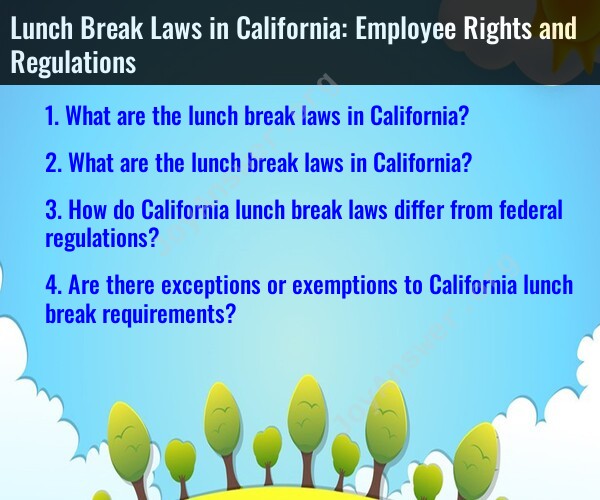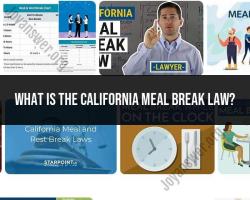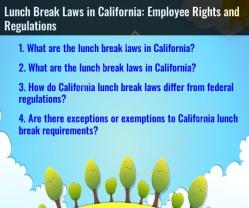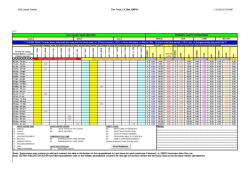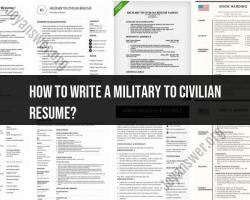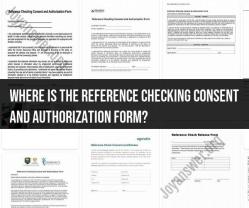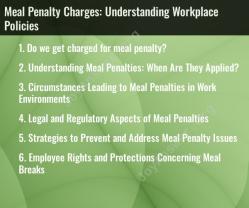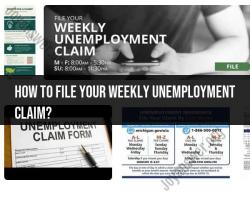What are the lunch break laws in California?
In California, lunch break laws are governed by various state labor regulations, including the California Labor Code and the Industrial Welfare Commission Wage Orders. Here are the key provisions regarding lunch breaks for employees in California:
Meal Break Timing: Under California law, non-exempt employees who work more than five hours in a day are entitled to a minimum 30-minute unpaid meal break. This meal break must be provided no later than the end of the employee's fifth hour of work.
Additional Meal Breaks: If an employee works more than ten hours in a day, they are entitled to a second 30-minute unpaid meal break. This second meal break must be provided no later than the end of the employee's tenth hour of work.
Waiver of Meal Breaks: Employees have the right to waive their meal breaks only if their total workday is no more than six hours. If an employee's total workday exceeds six hours, they must take at least one 30-minute meal break, regardless of any agreement to waive it.
On-Duty Meal Breaks: In limited circumstances, an employer may provide an "on-duty" meal break, where the employee eats while still working. However, this requires mutual agreement between the employer and the employee, and the nature of the work must prevent the employee from being relieved of all duties.
Penalties for Missed or Inadequate Meal Breaks: If an employer fails to provide a meal break as required by California law, they may be required to pay the employee one additional hour of pay at the employee's regular rate for each workday that the meal break is not provided. This is known as "meal period premium pay."
Record-Keeping Requirements: Employers must maintain accurate records of meal breaks provided to employees, including the time the meal break begins and ends. Failure to maintain these records may result in penalties for the employer in the event of a dispute.
It's important for both employers and employees to be aware of these lunch break laws and to ensure compliance with them. Employees should also be aware of their rights and speak up if they believe their employer is not providing them with the required meal breaks. If you have specific questions or concerns about lunch break laws in California, it's advisable to consult with an employment attorney or the California Division of Labor Standards Enforcement (DLSE) for guidance.
California Lunch Break Laws: A Breakdown
What are the lunch break laws in California?
California has its own set of lunch break laws, distinct from federal regulations. Here's the gist:
- Non-exempt employees:
- Meal break: After working 5 hours, you're entitled to an uninterrupted, unpaid meal break of at least 30 minutes. This break must start before the end of your 5th hour.
- Rest breaks: For shifts exceeding 4 hours, you get a 10-minute rest break for every 4 hours worked. These breaks can be paid or unpaid, depending on your employer's policy.
- Exempt employees:
- Executives, administrative, and professional employees who meet specific criteria are exempt from these break requirements. However, many employers still offer breaks to these employees as a courtesy.
How do California lunch break laws differ from federal regulations?
Federal law under the Fair Labor Standards Act (FLSA) doesn't mandate meal or rest breaks for non-exempt employees. However, California law provides greater protections by requiring these breaks for most employees.
Are there exceptions or exemptions to California lunch break requirements?
Yes, there are some exceptions and exemptions:
- Shifts shorter than 6 hours: For shifts under 6 hours, the meal break can be waived with your written agreement. However, rest breaks for shifts exceeding 4 hours still apply.
- Union contracts: If you have a union contract, it might supersede California law and dictate different break requirements.
- Emergency situations: In certain emergency situations, employers might be able to delay or shorten breaks.
Remember:
- These are just the general guidelines. Always consult with your employer's HR department or a labor law attorney for specific details and clarifications regarding your situation.
- You can find more information and resources from the California Department of Industrial Relations: [invalid URL removed]
